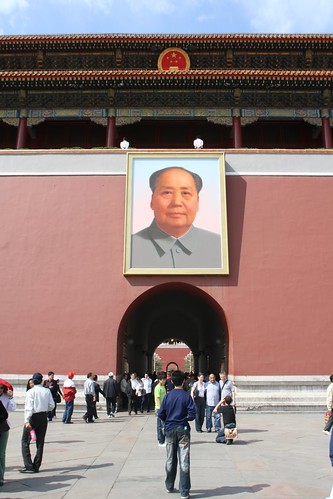For starters, while he is still omnipresent in China, the CCP no longer depends on Mao's 'revolutionary charisma'. In fact, they repudiated a large chunk of it 40 years ago after the disasters of the Cultural Revolution and the rise of Deng Xiaoping's pragmatic and realist perspectives on governance.
 |
| Postman Pat was also a fan of black-and-white cats. (Photo courtesy of Nic Walker on Flikr) |
Secondly, the economy is still performing ok. Whether that can still be maintained is a matter for debate, but for the time being, despite all the known problems about corruption, pollution etc., the Party is to a large extent continuing to deliver the public goods.
 |
| State Department photo of Sec. of State John Kerry meeting Pres. Xi Jinping |
Predictions of political crisis in China are as old as the People's Republic itself, and personally I do not see one happening during the tenure of Xi Jinping as President.
I have been predicting for several years that those who held out hope that he would bring fresh ideas were going to be sadly disappointed. What I didn't expect, however, was how apparently completely devoid of new ideas he would be. Moreover, I didn't expect that part of the fallout of the Bo Xilai affair would be that Xi and the Politburo Standing Committee would see the attraction in appearing to mimic some of Bo's more hardline approaches. His recent comments on Taiwan speaks of a Chinese leader who has nothing of substance to say.
(See also here: Xi Jinping tells Hong Kong to stick to Basic Law on reform)
The saving grace for the CCP is that although China's growing class will continue to develop 'middle class values', they will also continue to have deeply Chinese values, one of which is an urban/wealthy contempt mixed with fear of the illiterate peasantry. (The prevalence of this was one of the reasons Mao launched the Cultural Revolution). China's newly minted middle-classes do not want to give the vote to the great unwashed masses for many of whom Mao and his egalitarian poverty still actually does have a charismatic revolutionary allure.
Mao: Still hanging in there
The irony for China's dictatorial party is that if they didn't proclaim themselves to be socialist, it would be easy for them to introduce some type of limited democratic change tied perhaps to property or literacy. The democratization of village elections 15 years ago was widely believed at the time to be the first step in a process, but the Party Centre has not expanded it up the electoral chain, clearly because of dissatisfaction not with the results, but with the process (see above). Even for the CCP, for whom white can be black and vice versa, democratic socialism that is neither democratic nor socialist is probably a trick beyond even their levels of conjury. The result will be that the rest of the world will spend the next few decades predicting political crisis in China, as leader after leader avoids doing anything that could make them 'China's Gorbachev'.

No comments:
Post a Comment